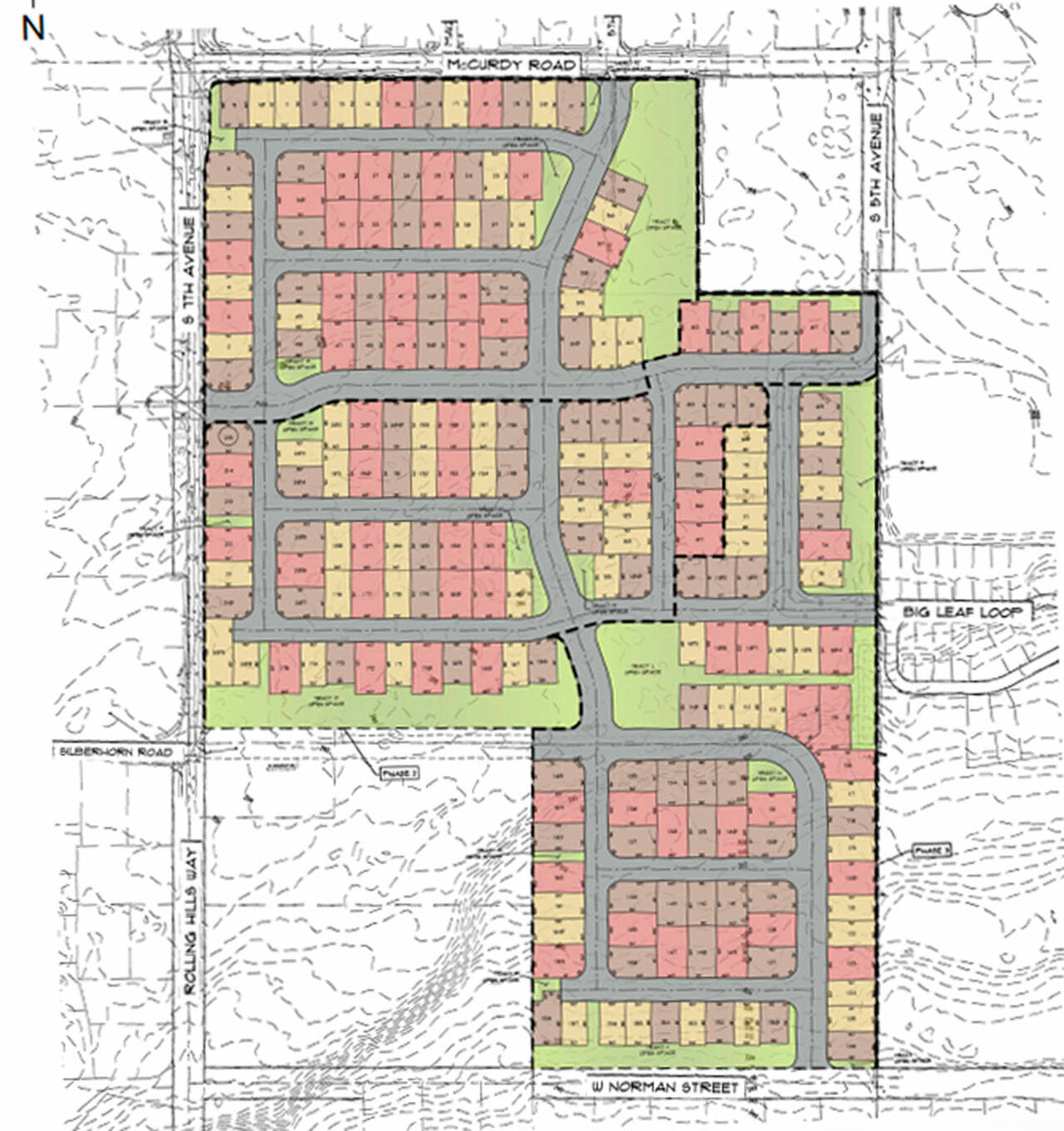After weeks of consideration, city of Sequim-appointed hearing examiner Andrew Reeves has approved a proposed 215-single-family home subdivision off South Seventh Avenue.
Reeves imposed 65 conditions in his Aug. 29 decision for developer JWJ Group, including: an archaeological site study; additional sidewalks and landscaping buffers, and documentation for an abandoned irrigation ditch, lighting, trees and more.
Reeves heard testimony on July 28 at a hybrid in-person/online hearing. He extended public comment a week and developer response an additional week. Those looking for him to reconsider his decision had until Sept. 4 to file with the city.
His final decision is subject to only one reconsideration, and his decision comes in 10 days of receiving it from the city.
Wednesday, Sept. 21 is the deadline to appeal to Clallam County Superior Court.
City staff said some individuals have inquired about reconsideration but have not formally requested reconsideration as of the morning of Friday, Sept. 2.
JWJ Group has not responded to a request for comment on Reeves’ decision.
Some Dominion Terrace homeowners say they plan to ask for Reeves’ reconsideration. Their issues include an alleged lack of notification to homeowners within 300 feet of the proposed property, and that there needs to be a setback from a water main on the east side of the property and a conditioned archaeological survey needs to be completed. They also want to know if there’s a discrepancy in application forms allowing for more housing density.
Response
In his decision, Reeves addressed community members’ concerns about the three-phase project on 44.1 acres at the southeast corner of South Seventh Avenue and McCurdy Road.
Some neighbors shared concern about a lack of notification about the development around the property, but Reeves said the notice was consistent with the city’s Municipal Code and that its materials were effective because of the “numerous comments submitted prior to the hearing and by the significant public participation at the hearing.”
At the hearing, Steve Lachnicht — the City of Sequim’s director of community development director — said city staffers are looking to provide an update later to the city code to increase efficiency of contacting neighbors about proposed developments.
Reeves mentioned in his decision various concerns about density, compatibility, traffic and safety for the proposed South Seventh Avenue subdivision.
“Although several members of the public expressed opposition to the proposed development, it must be noted that community displeasure, alone, cannot be the basis of a permit denial,” Reeves wrote.
He added that the development was consistent with the city’s Comprehensive Plan goals and policies, and the developer could have built 222 dwelling units under the city code instead of 215.
Traffic
As for traffic concerns, Reeves said the development’s traffic load – expected to be about 2,122 average weekday daily vehicle trips to the area — would be acceptable, except for the intersection at South Sequim Avenue and U.S. Highway 101 on/off ramps.
Reeves said the intersection “would operate at a deficient level of service under future conditions,” but that it’s offset by a plan to add a traffic signal on the bypass in the city’s six-year Transportation Improvement Program plan.
For an interim measure, he said city staff look to install an all-way stop in consultation with Washington’s Department of Transportation. As part of its traffic impact fees, JWJ Group must pay about $565,000 to the city for its impact on traffic.
Addressing concerns about Norman Street’s frequent pedestrian use and lack of vehicle traffic, Reeves is requiring JWJ Group construct sidewalks.
City staff previously required the developer in the city’s conditions to connect Norman Street between Third and Seventh Avenues.
Conditions
At the July hearing, JWJ Group representatives said they agreed to city staff’s conditions, which now overlap with some of Reeves’ conditions, including a restriction of construction between 7 a.m.-7 p.m., Monday through Saturday.
Developers also said they agreed to a professional archaeological survey of the project given to the Department of Archaeology and Historic Preservation, and Jamestown S’Klallam Tribe, as a state official said in city documents that the area has “high sensitivity” as its “adjacent to a previously recorded archaeological site, which may extend into the current proposed project area.”
Reeves also set conditions that the developer provide a lighting plan, stormwater plan, and demonstrate how a bike/ shared path is accommodated along Seventh Avenue frontage, and how access to school bus stops from the development.
Other conditions range from establishing homeowners associations to dust mitigation to utility piping distances.
Homes/property
City documents state the “middle income” homes range in lot size from 4,217 to 7,942-square feet with the entire property providing the city required minimum 15 percent open space at 287,929 square feet of open space. JWJ Group plans to install 470 street trees and 24 trees in open spaces, documents state.
There is a planned 6-foot fence around the property and 10-foot landscaping buffer along South Seventh Avenue.
Developer representatives said they’d plan to build the homes within five years.
In three phases, phase 1 would include 62 lots, phase 2 with 76 lots, and 77 lots in phase 3.
Reeves agreed with the developers’ consultants that there are no geologic hazard areas, indicators of wetlands or streams, and critical areas on site.
For a reported abandoned irrigation ditch, he’s requiring documentation that it’s abandoned from Highland Irrigation.
Stormwater on the property is planned to be collected and piped to a pond where it’ll be infiltrated into the ground, city documents state.
For more about the Rolling Hill development, visit sequimwa.gov/471/Current-Projects.


